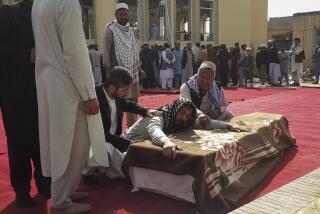Blair Hails Pakistan for Joining U.S.-Led Anti-Terror Coalition
ISLAMABAD, Pakistan — In a visit designed to bolster support for the cause in a key nation bordering Afghanistan, British Prime Minister Tony Blair on Friday reassured Pakistan’s military government that it “made the right choice” in joining the international coalition against terrorism.
Blair also promised economic support and humanitarian aid, but his main message was recognition of the difficult political position taken by Pakistan’s president, Gen. Pervez Musharraf, in backing the U.S.-led coalition.
As if to underline the sometimes dicey situation here, only a few hours before Blair arrived more than 10,000 men emptied out of mosques after Friday prayers in nearby Rawalpindi shouting anti-American and anti-Musharraf slogans. Several of the demonstrators burned U.S. flags and crude effigies of President Bush. Smaller demonstrations took place in other parts of Pakistan.
In this political climate, said Rifaat Hussain, chairman of the department of defense and strategic studies at Quaid-i-Azam University in Islamabad, “it was very important to have one of the key world leaders back up Pakistan’s stand. If you can’t get Bush, the next best thing is Tony Blair.”
In a news conference after meetings with Musharraf, an army general who overthrew the elected government in 1999, the British leader told a national television audience here that coalition efforts to oust terrorism suspect Osama bin Laden from neighboring Afghanistan are not an attack on Islam, as some conservative religious leaders in the region contend.
“The 11th of September was an outrage against the civilized values of all peoples of all faiths in the world,” Blair said of the attacks last month on the United States. “This was not a crime against the West. It was a crime against humanity.”
Blair also repeated that any retaliation will not be directed against the Afghan people, who are suffering from the effects of more than a generation of conflict.
“What is important is that any action we take is proportionate, is targeted and is not directed against the Afghan people, who are not our enemy,” Blair said.
Directly addressing Pakistani fears about the stability of its neighbor should Afghanistan’s Taliban regime fall, Blair said he would support a new government only if it represented a broad cross-section of ethnic groups, including the dominant Pushtuns, from which the Taliban draws most of its support.
A similar message was being presented to Pakistani journalists Friday by U.S. Ambassador Wendy Chamberlin.
“The Taliban must go,” Chamberlin said of the fundamentalist Islamic movement that has ruled most of Afghanistan for five years. Chamberlin said any government that replaces the Taliban needs to encompass all ethnic groups, including Pushtuns, Tajiks and Uzbeks.
“The government in Afghanistan has to be the choice of the Afghans,” Chamberlin said. “This has to come from within.”
Blair’s visit carries extra weight in Pakistan, which Britain ruled until 1947. The colonial legacy endures in the English language spoken by many Pakistanis and in social and cultural traditions ranging from cricket to the British-style civil service system.
When Musharraf seized power two years ago, Blair was one of his biggest critics, leading efforts to exclude Pakistan from the Commonwealth, the association of former British territories.
But on Friday there was only the briefest mention of the democracy issue, with Blair endorsing a Musharraf proposal to hold elections next October.
“After Sept. 11,” noted Hussain, the academic, “there’s been a change in climate here. Now Pakistan is being viewed as one of the key allies in the fight against terrorism.”
On Thursday, Pakistan became the first Muslim country to say that U.S. evidence connects Bin Laden to the attacks on the World Trade Center and the Pentagon.
In Quetta, a western provincial capital, Taliban Ambassador Abdul Salam Zaeef on Friday accused Blair of coming to Pakistan “to encourage war.” However, Zaeef avoided any criticism of Pakistan, the only country that still recognizes the Taliban as the legitimate government of Afghanistan.
Meanwhile, fresh video footage surfaced Friday showing Bin Laden near dry, rugged mountains, somberly watching followers and flanked by his top lieutenant, Ayman Zawahiri, and other aides.
The images were broadcast on Qatar’s Al Jazeera satellite TV network, often one of the first sources of material from Bin Laden. The network said it believed that the scene showed a celebration of the union of Bin Laden’s Al Qaeda terrorist network and Zawahiri’s Egyptian Islamic Jihad group. Bin Laden made no statement, and it was unclear when the images were taken.
More to Read
Sign up for Essential California
The most important California stories and recommendations in your inbox every morning.
You may occasionally receive promotional content from the Los Angeles Times.










